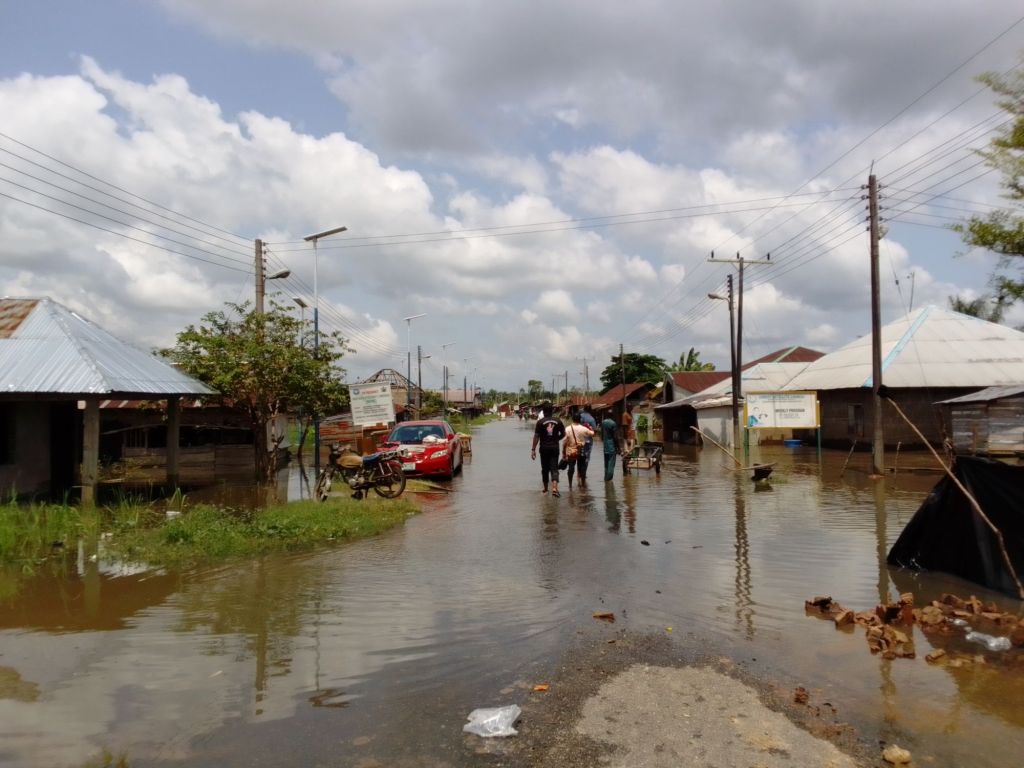By Adeyemi Adekunle
The idyllic landscapes of Biseni Kingdom have been transformed into veritable lakes, as flood waters from the Rivers Niger and Benue, along with the Orashi River, have wreaked havoc across the region, displacing thousands of families. Communities that once thrived on agriculture and commerce now find themselves submerged, with houses, schools, and health facilities engulfed in murky waters.
From Kilama to Perebiri, Ayahkumo, Egbebiri, and Tuburu, residents recount a harrowing tale of suffering as they seek refuge on makeshift camps, roadways, and even bridges. Their cries for assistance echo, urging both the Federal Government and Bayelsa State authorities to act swiftly to alleviate their plight. In 2022, a report released by the Bayelsa State Emergency Management Agency put that not less than 96 deaths were recorded and millions of people displaced.
“This is an unbearable situation,” laments one displaced resident, Oweifa Godday, the secretary to the chiefs’ council, who now finds refuge on a bridge, away from his family. “We are separated from our loved ones, and the anxiety is overwhelming.”
The Ibedaowei of Biseni clan, King David Obuma, a former Majority Leader in the State House of Assembly, has labeled the government’s response as inadequate. “We feel abandoned in our time of need. The floods have led to serious hunger and shelter issues. We urgently require sandfill to create higher ground for temporary refuge, alongside the formulation of long-term solutions such as embankments and dams,” he stated during a recent community assessment.
The situation is exacerbated by the presence of oil wells and gas facilities in Biseni Kingdom, leading locals to voice frustration at the perceived neglect by the government despite their resource-rich environment. “We get nothing but flood disasters every year. It is time for the government to step up and provide relief materials, and to establish camps for internally displaced persons,” urged King Akile Peter Debekeme, the Pere of Biseni. For Biseni Kingdom climate change has at the helm in the community daring and swaying it power not only on the livelihood but scrutinizing the people’s daily lives. In 2018 there was show of might on the community by thunderstorm cutting through the nooks and crannies of the community.
Environmental advocacy groups are also raising alarms over the dire conditions faced by residents. Chief Alagoa Morris, Deputy Executive Director of the Environmental Defenders Network, visited Biseni to assess the situation firsthand. He described the living conditions as “pathetic,” demanding urgent intervention from both the state and federal governments.
In a stark criticism of the now-dissolved Niger Delta Ministry, Morris called for the Niger Delta Development Commission to intervene and aid the people while also urging the Bayelsa State government to efficiently utilize the N3 billion allocated for disaster relief.
“There has to be a transparent mechanism in place to distribute aid, ensuring that it reaches those who need it most,” he asserted, addressing ongoing concerns about political appointees allegedly diverting resources meant for victims.
The flooding crisis in Bayelsa State isn’t isolated to Biseni Kingdom alone. It has spread to multiple communities, including Epie Kingdom in Yenagoa, Sampou in Kolokuma-Opokuma, Sagbama, and Ogbia, impacting dozens of families and further highlighting the urgent need for infrastructure improvements and disaster preparedness.
As the waters show little sign of receding, it is essential for the government to not only provide immediate relief but also to consider long-term strategies that prioritize safeguarding communities from future flood risks. The people of Biseni and surrounding areas are in desperate need of a lifeline.
As this situation develops, the stories emerging from the flood-stricken areas reveal a community that yearns for recognition, assistance, and action. They are not merely statistics of natural disasters; they are families, children, and elders, each with their own stories of loss and hope. They remind us that behind every plea for help is a life disrupted.
It is time for collective action—both from governmental leaders and the Nigerian populace—to ensure that the voices of those in Biseni Kingdom and beyond are heard, and that concrete support is provided in their time of crisis.




